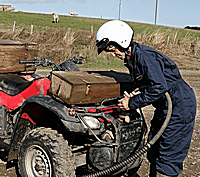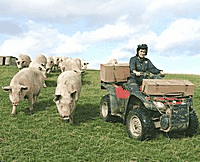Giving petrol the heave ho
 For one Scottish pig producer the increase in fuel prices has seen the farm’s fuel bill rise to a staggering 56,000 a year – and that is just on petrol for quad bikes.
For one Scottish pig producer the increase in fuel prices has seen the farm’s fuel bill rise to a staggering 56,000 a year – and that is just on petrol for quad bikes.
Grampian Country Pork keeps 12,000 sows on 28 outdoor units across north east Scotland.
Employed for general feeding and bedding, the company has 50 bikes in operation at any one time.
Each ATV burns an average of 30 litres of petrol each week, which explains why the fuel bill is astronomically high, even priced at a competitive 75p/litre for bulk delivery.
According to Grampian’s financial controller Dave Smith, the fuel cost is something which has become unsustainable given the current state of the UK pig industry.
“We’ve been driven to reduce costs as far as possible and because the bikes are such an essential part of our business, we have had to look for alternatives as regards fuel,” says Mr Smith.
With limited development from ATV manufacturers on the diesel front, the farm has switched to liquid petroleum gas (LPG) power.
 “We have tried other makes but having run Honda bikes for years, they have proved to be the most reliable machines we can get our hands on,” says Mr Smith.
“We have tried other makes but having run Honda bikes for years, they have proved to be the most reliable machines we can get our hands on,” says Mr Smith.
Grampian currently runs 15 quads on LPG with the mind to increase this figure as the older bikes are replaced.
He points out that the ATVsbikes run seven days a week, 52 weeks of the year, which requires a carefully planned service and maintenance programme.
“We try to replace the bikes after two or three years service, this means they still have a decent resale value,” adds Mr Smith.
The conversion to LPG has been a longwinded and frustrating process at times for Grampian.
Initially the bikes which were running purely on LPG posed little or no problems, but the more recent arrivals are dual fuel.
This basically means that should the bikes run out of LPG the operator can switch back to petrol fuel at the turn of a switch.
This led to a disconcerting discovery – when running on LPG it was found that the bikes were low on power and were not able to pull the feed trailers on demanding terrain.
This became obvious when they were switched back to petrol for any reason.
However Mr Smith maintains that the cost saving makes LPG conversions worthwhile, despite the fact the fuel consumption rises by 10% when running on LPG.
The cost is 25p/litre – which is duty free as the bikes are not used on the road – compared to the 75p/litre for unleaded fuel.
The LPG kits cost 950 to fit per bike, amounting to 14,250 for 15 bikes.
These kits are transferable from old bikes to new which means that over two years the kits can be costed at 475 per year.
“We are continuously working with our Honda dealer, Calor Gas and the LPG kit manufacturer to address the ongoing issues, it is a tough process at times but one we feel is worth sticking with.”

